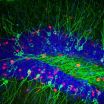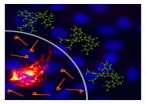(Press-News.org) After outgrowing teenage infatuations with the girl next door, adult males seem to be biologically designed to avoid amorous attractions to the wife next door, according to a University of Missouri study that found adult males' testosterone levels dropped when they were interacting with the marital partner of a close friend. Understanding the biological mechanisms that keep men from constantly competing for each others' wives may shed light on how people manage to cooperate on the levels of neighborhoods, cities and even globally.
"Although men have many chances to pursue a friend's mate, propositions for adultery are relatively rare on a per opportunity basis," said Mark Flinn, professor of anthropology in the College of Arts and Science. "Men's testosterone levels generally increase when they are interacting with a potential sexual partner or an enemy's mate. However, our findings suggest that men's minds have evolved to foster a situation where the stable pair bonds of friends are respected."
Flinn says that these findings might help solve global problems.
"Ultimately, our findings about testosterone levels illuminate how people have evolved to form alliances," said Flinn. "Using that biological understanding of human nature, we can look for ways to solve global problems. The same physiological mechanisms that allow villages of families to coexist and cooperate can also allow groups like NATO and the U.N. to coordinate efforts to solve common problems. The more we view the Earth as a single community of people, the greater our ability to solve mutual threats, such as climate change."
Evolutionarily, men who were constantly betraying their friends' trust and endangering the stability of families may have caused a survival disadvantage for their entire communities, according to Flinn. A community of men who didn't trust each other would be brittle and vulnerable to attack and conquest. The costs of an untrustworthy reputation would have outweighed the benefits of having extra offspring with a friend's conjugal companion.
For example, a cautionary tale of the dangers of adultery can be found in the myth of Camelot. Sir Lancelot betrayed King Arthur by seducing Guinevere. Soon after, the fellowship of the Knights of the Round Table disintegrated and the kingdom fell. The alliance of powerful males could not hold once trust had been lost.
###
The study "Hormonal Mechanisms for Regulation of Aggression in Human Coalitions" was published in the journal Human Nature. Co-authors were Davide Ponzi of MU's Division of Biological Sciences in the College of Arts and Science and Michael Muehlenbein of Indiana University.
Men may have natural aversion to adultery with friends' wives
Findings about testosterone levels illuminate how humans evolved to form alliances
2013-03-21
ELSE PRESS RELEASES FROM THIS DATE:
Scientists develop drug that might be next best hope against malaria
2013-03-21
PORTLAND, Ore. – Scientists at Oregon Health & Science University and the Portland VA Medical Center have developed a drug that may represent one of the world's best hopes for treating and preventing malaria — a disease that kills more than one million people each year.
The scientists have described the drug, and its effectiveness against mice infected with malaria, in the March 20 issue of Science Translational Medicine, an interdisciplinary journal of the American Association for the Advancement of Science.
The drug — called ELQ-300 — "is an exciting compound as it ...
The neuroscience of finding your lost keys
2013-03-21
LA JOLLA, CA----Ever find yourself racking your brain on a Monday morning to remember where you put your car keys?
When you do find those keys, you can thank the hippocampus, a brain region responsible for storing and retrieving memories of different environments-such as that room where your keys were hiding in an unusual spot.
Now, scientists at the Salk Institute for Biological Studies have helped explain how the brain keeps track of the incredibly rich and complex environments people navigate on a daily basis. They discovered how the dentate gyrus, a subregion of ...
Parents should do chores together, study says
2013-03-21
You may have heard of couples that strive for exact equality when it comes to chores, i.e. I scrub a dish, you scrub a dish, I change a diaper, you change a diaper.
But new research finds that keeping score with chores isn't the best path to a high-quality relationship. Instead the data points to two items that should have a permanent place on a father's to-do list:
Do housework alongside your spouse
Spend quality time with the kids
"We found that it didn't matter who did what, but how satisfied people were with the division of labor," said Brigham Young University ...
To forgive or not to forgive: What Josh Hamilton tells us about sports fandom
2013-03-21
In a recently published article in Communication & Sport, Jimmy Sanderson, assistant professor in the Department of Communication Studies at Clemson University, and Elizabeth Emmons, a doctoral student in the College of Communication and Information Sciences at the University of Alabama explore people's willingness to forgive then Texas Rangers player Josh Hamilton after an incident in January 2012.
Hamilton serves as a unique study for fan behavior, as he as arguably generates as much attention as a human interest story as he does for his athletic performance. Hamilton's ...
Tackling issues of sexuality among people with dementia
2013-03-21
Managing the delicate issue of sexual expression amongst people with dementia is the focus of a new education resource produced by Griffith University researcher Dr Cindy Jones.
The first resource of its kind and the subject of funding from the Department of Health and Aging and Queensland Dementia Training and Study Centres (DTSC),
Sexualities and Dementia: Education Resource for Health Professionals is aimed at assisting health professionals working across care settings.
Based on national and international literature and research by Dr Jones from
Griffith's Centre ...
Study reveals potential treatments for Ebola and a range of other deadly viruses
2013-03-21
Illnesses caused by many of the world's most deadly viruses cannot be effectively treated with existing drugs or vaccines. A study published by Cell Press in the March 21 issue of the journal Chemistry & Biology has revealed several compounds that can inhibit multiple viruses, such as highly lethal Ebola virus, as well as pathogens responsible for rabies, mumps, and measles, opening up new therapeutic avenues for combating highly pathogenic viruses.
"The medical field currently does not have ideal antiviral therapies, often no therapeutics at all, and the development ...
Harnessing immune cells' adaptability to design an effective HIV vaccine
2013-03-21
In infected individuals, HIV mutates rapidly to escape recognition by immune cells. This process of continuous evolution is the main obstacle to natural immunity and the development of an effective vaccine. A new study published by Cell Press in the March 21 issue of the journal Immunity reveals that the immune system has the capacity to adapt such that it can recognize mutations in HIV. The findings suggest that our immune cells' adaptability could be harnessed to help in the fight against AIDS.
An international collaboration between research groups in France, England, ...
Functional characteristics of antitumor T cells change w increasing time after therapeutic transfer
2013-03-21
PHILADELPHIA — Scientists have characterized how the functionality of genetically engineered T cells administered therapeutically to patients with melanoma changed over time. The data, which are published in Cancer Discovery, a journal of the American Association for Cancer Research, highlight the need for new strategies to sustain antitumor T cell functionality to increase the effectiveness of this immunotherapeutic approach.
Early clinical research has indicated that cell-based immunotherapies for cancer, in particular melanoma, have potential because patients treated ...
Adults worldwide eat almost double daily AHA recommended amount of sodium
2013-03-21
Seventy-five percent of the world's population consumes nearly twice the daily recommended amount of sodium (salt), according to research presented at the American Heart Association's Nutrition, Physical Activity and Metabolism and Cardiovascular Disease Epidemiology and Prevention 2013 Scientific Sessions.
Global sodium intake from commercially prepared food, table salt, salt and soy sauce added during cooking averaged nearly 4,000 mg a day in 2010.
The World Health Organization recommends limiting sodium to less than 2,000 mg a day and the American Heart Association ...
Japanese researchers identify a protein linked to the exacerbation of COPD
2013-03-21
Researchers from the RIKEN Advanced Science Institute and Nippon Medical School in Japan have identified a protein likely to be involved in the exacerbation of chronic obstructive pulmonary disease (COPD). This protein, Siglec-14, could serve as a potential new target for the treatment of COPD exacerbation.
In a study published today in the journal Cellular and Molecular Life Sciences the researchers show that COPD patients who do not express Siglec-14, a glycan-recognition protein, are less susceptible to exacerbation compared with those who do.
COPD is a chronic ...
LAST 30 PRESS RELEASES:
Scientists reveal our best- and worst-case scenarios for a warming Antarctica
Cleaner fish show intelligence typical of mammals
AABNet and partners launch landmark guide on the conservation of African livestock genetic resources and sustainable breeding strategies
Produce hydrogen and oxygen simultaneously from a single atom! Achieve carbon neutrality with an 'All-in-one' single-atom water electrolysis catalyst
Sleep loss linked to higher atrial fibrillation risk in working-age adults
Visible light-driven deracemization of α-aryl ketones synergistically catalyzed by thiophenols and chiral phosphoric acid
Most AI bots lack basic safety disclosures, study finds
How competitive gaming on discord fosters social connections
CU Anschutz School of Medicine receives best ranking in NIH funding in 20 years
Mayo Clinic opens patient information office in Cayman Islands
Phonon lasers unlock ultrabroadband acoustic frequency combs
Babies with an increased likelihood of autism may struggle to settle into deep, restorative sleep, according to a new study from the University of East Anglia.
National Reactor Innovation Center opens Molten Salt Thermophysical Examination Capability at INL
International Progressive MS Alliance awards €6.9 million to three studies researching therapies to address common symptoms of progressive MS
Can your soil’s color predict its health?
Biochar nanomaterials could transform medicine, energy, and climate solutions
Turning waste into power: scientists convert discarded phone batteries and industrial lignin into high-performance sodium battery materials
PhD student maps mysterious upper atmosphere of Uranus for the first time
Idaho National Laboratory to accelerate nuclear energy deployment with NVIDIA AI through the Genesis Mission
Blood test could help guide treatment decisions in germ cell tumors
New ‘scimitar-crested’ Spinosaurus species discovered in the central Sahara
“Cyborg” pancreatic organoids can monitor the maturation of islet cells
Technique to extract concepts from AI models can help steer and monitor model outputs
Study clarifies the cancer genome in domestic cats
Crested Spinosaurus fossil was aquatic, but lived 1,000 kilometers from the Tethys Sea
MULTI-evolve: Rapid evolution of complex multi-mutant proteins
A new method to steer AI output uncovers vulnerabilities and potential improvements
Why some objects in space look like snowmen
Flickering glacial climate may have shaped early human evolution
First AHA/ACC acute pulmonary embolism guideline: prompt diagnosis and treatment are key
[Press-News.org] Men may have natural aversion to adultery with friends' wivesFindings about testosterone levels illuminate how humans evolved to form alliances


